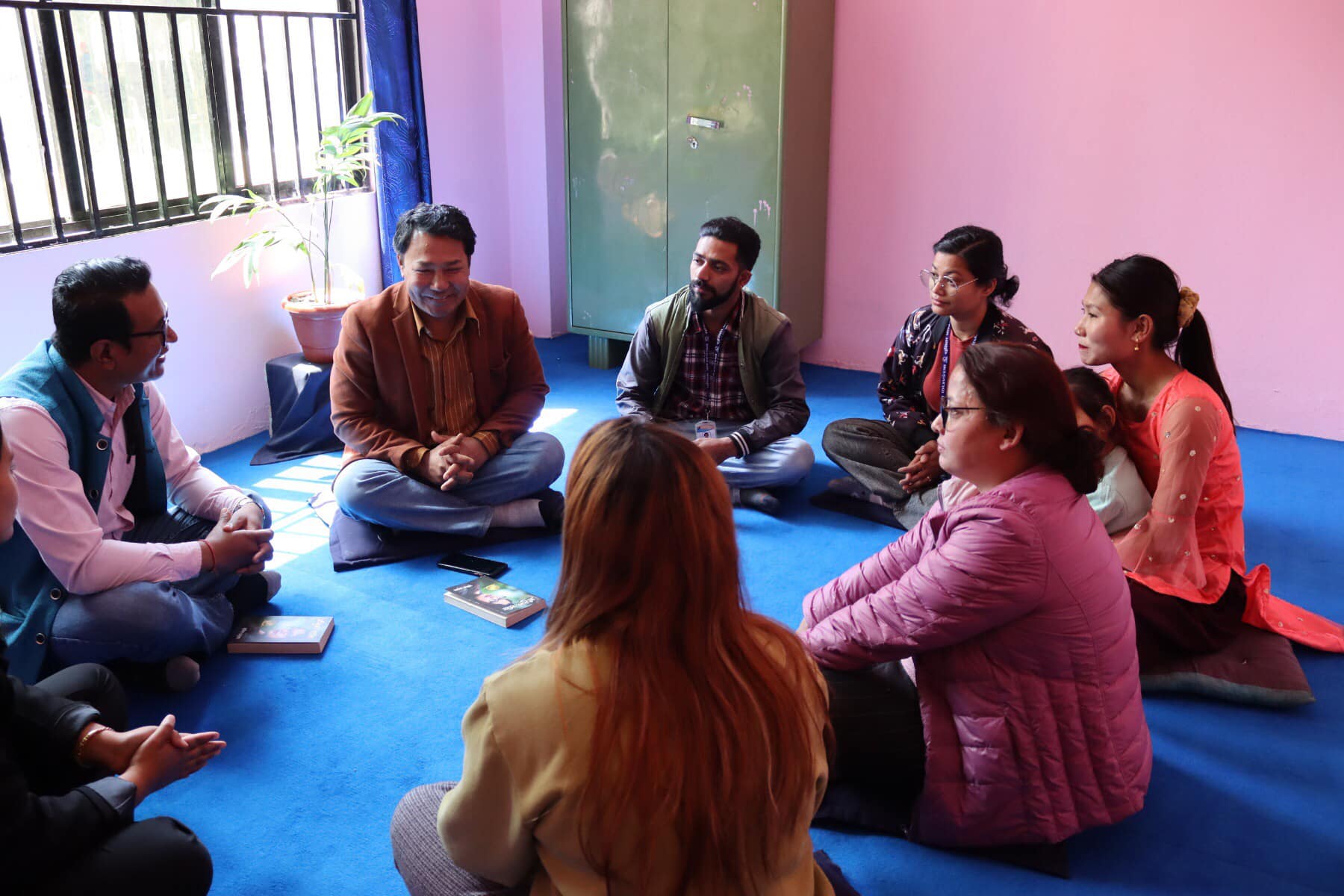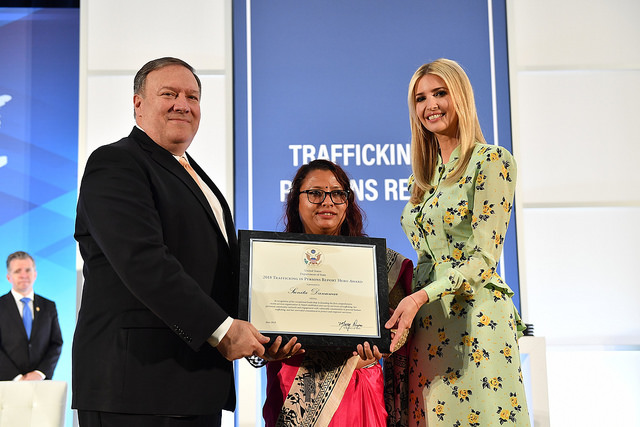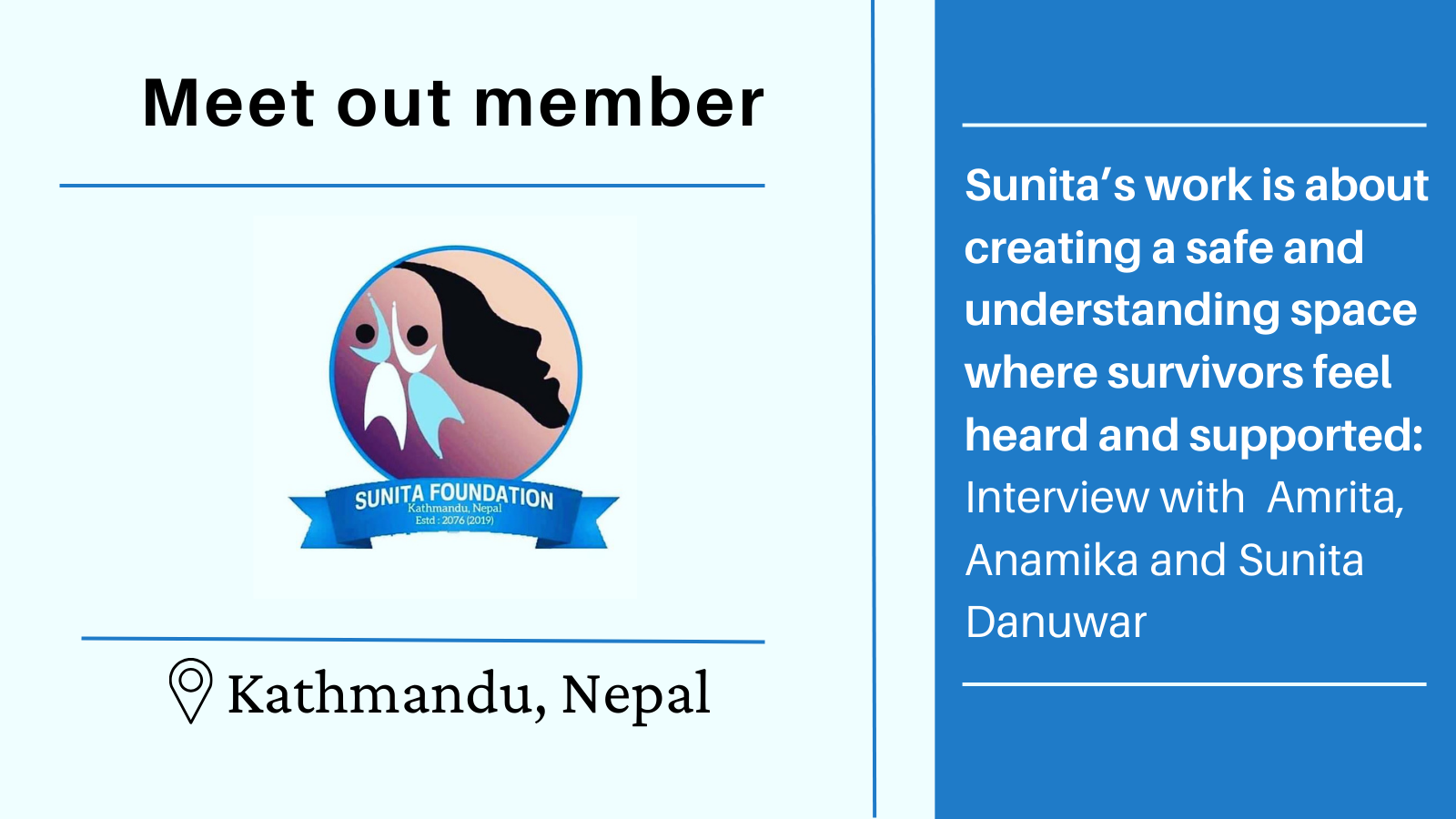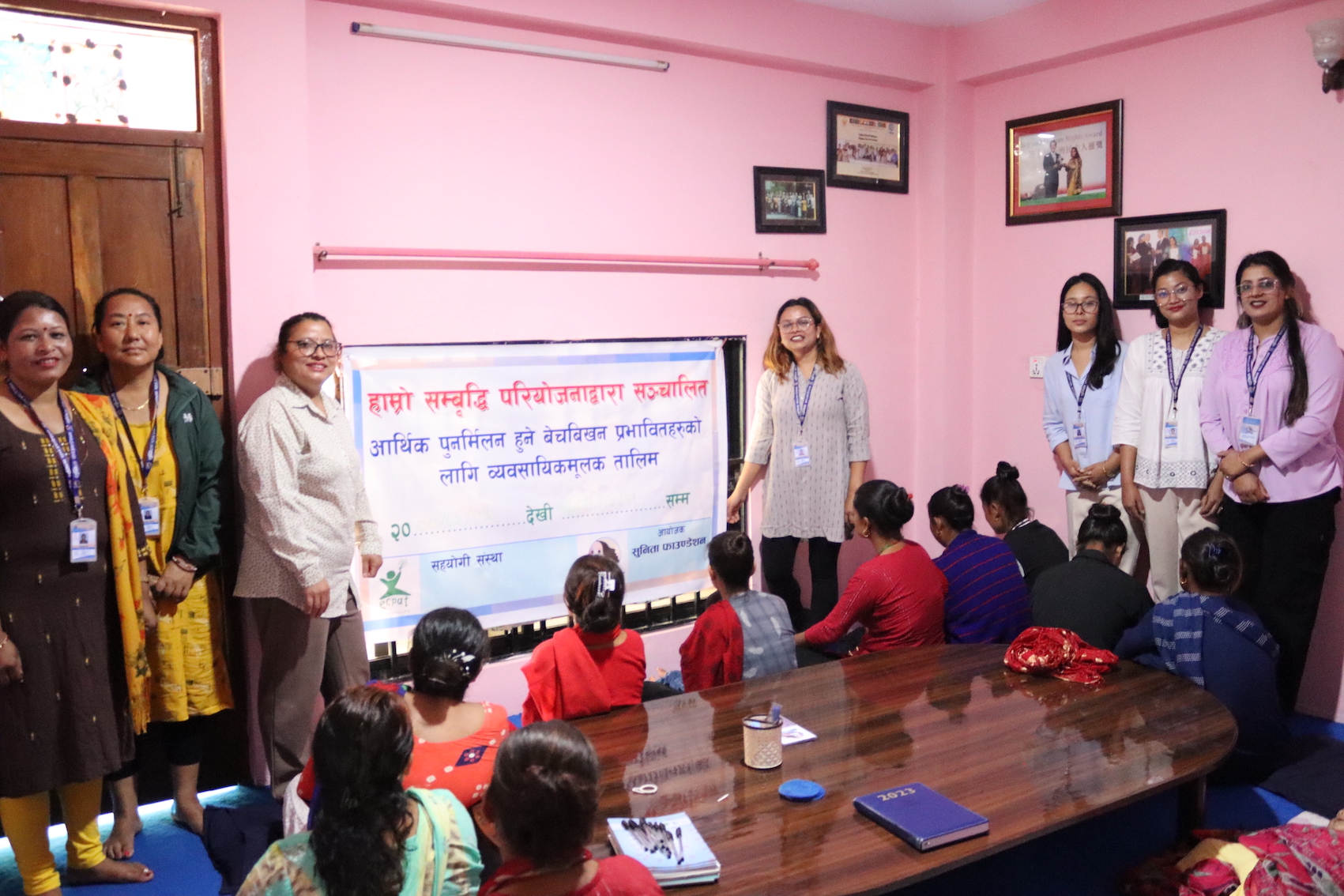Sunita Foundation is a non-profit organization established by human trafficking survivors in 2019 AD. The foundation focuses on youth empowerment to prevent human trafficking at the grassroots level and raises awareness on human trafficking as an issue of national importance in Nepal. Srishty Anand and Michelle Moe from the GAATW secretariat conducted an interview with Amrita, who works as a Psychosocial counselor; Anamika, as a project officer; and Sunita, the founder president of Sunita Foundation.
Sunita: Namaste! Sunita Foundation is a member of GAATW, and I am also the founder of Shakti Samuha. Thank you for your time and for giving us the opportunity to share our experiences and actions.
Shristy: Welcome Sunita! Can you give us a background on how you started Shakti Samuha along with the anti-trafficking movement in Nepal? And then, how did these events lead to the formation of the Sunita Foundation?
Sunita: Yes, Shakti Samuha was formed in 1996 by trafficking survivors. In 1996, the Indian government conducted a raid in the red-light area of Mumbai. They rescued around 500 girls below 18 years old who had been trafficked for years. Around 300 were from Nepal, and I was one of them. They rescued us and placed us in an Indian shelter. However, the staff at the shelter had plenty of rules. Although they provided us with food, it was more like a prison. We spent six or seven months at the shelter in India. At that time, the government denied our repatriation to Nepal because they wanted proof that we were Nepalese, and they also feared that we would spread HIV. There were many civil society groups in Nepal at the time working on human rights, child rights, women's rights, and anti-trafficking. They decided to challenge our government and help us with our repatriation to Nepal. At that time, many organizations were involved, but only 7 had shelters, and only 128 of us were placed among them.
The Nepalese media published negative news, calling us Nepalese sex workers who were infected with HIV. When we arrived at the airport in Nepal, there were big cameras, and lots of people were waiting for us. We felt fear because they took our photos to publish in newspapers so everyone would know our identities. We were crying inside the plane, but as we got off, we covered our faces. When we came through immigration, the representatives from the seven organisations with shelters were present to inform us about the capacity of each of their shelter homes. In our minds, we thought, ''We are not cattle, why are you counting us as numbers?'' Other 18 girls and I stayed together at one shelter.
Some girls and I planned where and when to go and what kind of work to do so that we could stick together and not be separated. We were afraid to be separated, and since we had no experience in Nepal, we requested that organisations take us together. At that time, Doctor (Renu Adhikari) was the president of WOREC Nepal, and We were in the shelter of Worec. We faced a lot of problems because of the stigma. When we needed to go to the hospital for a checkup, nurses and doctors did not want to touch us and would wear 5 or 6 pairs of gloves. One Saturday, we planned to go to a nearby temple, but, when we got there, people were saying, “Don’t touch, don’t touch, they come from Mumbai, so they have HIV.” This environment and behavior made us cry and feel and thought being trafficked was our fault. At that time, 4 out of every 12 girls had HIV and they thought this meant that they would die immediately. We thought that because we were in the same place, that meant we may also get it in the future. We felt different because of the way they treated us.

Doctor Renu realized our situation and decided to organize training for 30-35 girls. This training focused on positive thought , capacity building, reproductive health and gender theory. However, there are so many issues on trafficking, like who is trafficked, why they are trafficked, how to prevent HIV/other diseases, human rights, women's rights, child rights, etc. The whole package. There were 15 of us who participated in the training. The training helped me realise that being trafficked was not my fault and that we must fight against the stigma in society. Before the training, we cried many times, but we decided to turn our tears into power. This is why we established Shakti Samuha back in 1996.
So, how did the Sunita Foundation start? I spent 23 years with Shakti Samuha. When the media came for interviews, the survivors working with us were often hesitant to share their stories and struggles. However, people would often mention my name when there was something important to say to a larger audience. I realized that the survivors had their own unique strengths and abilities, and they could do great work even without my constant presence because I couldn't always be there.
I felt it was time for a new generation to step forward and speak up, so I decided to leave. However, being a survivor myself, I couldn't stop working to support survivors and empower others like us. That's why I founded the Sunita Foundation. Our goal is to help survivors and vulnerable children, providing them with the support they need to improve their lives.
Srishty: What is the difference between Shakti Samuha and Sunita Foundation?
Sunita Foundation stands out from other anti-human trafficking NGOs in several ways. While our common goal is to combat human trafficking, our approach and methods differ.
Sunita Foundation places a crucial emphasis on preventing human trafficking in addition to helping survivors. We do this by concentrating on Youth Economic Empowerment through modern agriculture farming. Many young people from rural areas in Nepal migrate abroad for education and job opportunities, putting them at risk of trafficking. By offering opportunities within Nepal's rich agricultural sector, we aim to reduce this risk and contribute to our country's agriculture.
Another distinctive aspect of our work is our efforts to raise human trafficking as a political agenda item for various political parties in Nepal. This means we work to make sure that the issue of trafficking is discussed and addressed at the political level, ensuring that it receives the attention and action it deserves. Sunita Foundation not only supports survivors but also focuses on preventing trafficking by empowering youth economically through agriculture. Additionally, we actively engage with political parties to prioritize and address the issue of human trafficking in Nepal.
We also work with survivors by providing training and livelihood support. A major challenge is that nobody knows the situation of trafficking survivors; that’s why they are trafficked over and over again. Because of this, we started supporting economic reintegration. This focuses on economic reintegration of the survivors in Kathmandu, Nuwakot, Sindhupalchowk and Makwanpur. We also provide vocational and beautician training. To carry out this, we coordinate with the survivors, local level governments and other organisations to provide activities related training as well. For example, one of our survivors is working as a beautician through a job placement, but her job will continue once her course is completed.
We also assess the economic, and educational conditions of the family of new survivors. We provide them with educational support, including their children. Right now, girls are in the protective home of SF. Some of them are going for psychosocial counseling training and getting Education Support. At the shelter, we have girls ranging from 9 to 18 years old. We also receive adult women.
We engage in continuous lobbying, advocacy, and coordination across various levels—local, provincial, district, national, and international. This ongoing effort is a vital part of our foundation's work.
The foundation works within four districts, but our central focus is on Kathmandu, where we provide protective home support and economic reintegration activities. However, when it comes to survivors, we have networks in other districts; we are not limited to only four districts.
Shristy: What are the core objectives of Sunita Foundation, and who do you work with? Do you work with just trafficking victims or with returnees? You mentioned economic reintegration support. Could you explain a little bit more about that?
Sunita: We work with the communities where we involve local stakeholders. We support survivors to continue their education in government schools (public schools).
We coordinate with all of the local level and district-level stakeholders because human trafficking issues are not only a challenge for organisations but for all government institutions. We involve the local level stakeholders in economic reintegration activities, awareness campaigns to reduce internal and external trafficking. We have identified internal trafficking cases in the entertainment industry, as well as in other sectors. We carry out awareness activities such as training for government school teachers about human trafficking issues. We also have these awareness activities in schools and colleges, for students and youth to get involved.
Shristy: Do you also support trafficking survivors who have returned to their communities? Are you involved with the rescue process, as well?
Sunita: Yes, we coordinate with related organisation to rescue survivors.
Shristy: Okay, you mentioned the internal and external trafficking and how cases of internal trafficking are mostly within the entertainment industry. Is there any specific trend or pattern in external trafficking?
Sunita: Yes, it is a changing trend because, around 1996, previously, there was a common misconception that trafficking routes were confined to India and primarily linked to brothel areas. However, today we are increasingly uncovering instances of trafficking in various guises, such as under the guise of foreign employment, marriage, the entertainment industry, surrogacy, and even in sectors like domestic labor.

In Nepal's entertainment industry, there are big problems with people being tricked and forced to work. This happens to kids too. The laws to stop this are not very strong, and many don't know about the risks. Women and girls are often hurt the most. Also, the people who do this sometimes take victims to other countries, making it harder to stop. We need to tell people about these dangers, make stronger laws, and help the victims.
Also, social media has become a platform for false information, so it makes easier for traffickers to lure girls. They connect with girls by sending a friend request and then start chatting with them. The trafficker will invite the girl to meet in person. They use fake promises and pretend they are in love with the girl. They show various ways of job opportunities. After that, they suggest them to go with them in various countries, and once they easily get manipulate and they sold them to a brothel. That is a trend nowadays.
Meanwhile, within the country, there are many cases where they are sold in brothels. We also provide training on the issue of trafficking within the context of migration and its link to domestic violence.
Shirsty: How do you incorporate the needs or perspectives of survivors since so much is changing, for example, social media? How do you build that understanding into your work with the survivors that are coming to you now?
Sunita: Incorporating the perspectives and needs of survivors is a priority in our work. We achieve this by conducting awareness programs in communities, schools, and colleges, aiming to educate people about the realities of trafficking. We collaborate closely with local government authorities to address the issue effectively, and our advocacy efforts extend to protecting survivors in the digital realm, where traffickers are increasingly active. Our dedicated counselor provides vital psychosocial support to help survivors heal from their traumatic experiences. Additionally, we maintain ongoing district-level meetings, allowing our staff to collaborate directly with survivors to identify and address their specific problems. It is equally crucial that we emphasize self-care and vigilance among survivors, as they must be aware that anyone, even an unknown person, could attempt to lure them back into trafficking. This focus on motivation and awareness not only helps reduce the risk of re-trafficking but also instills a sense of resilience and empowerment among survivors.
Shristy: As a counselor, do you see any challenging situations where it is very difficult for you to provide counseling?
Amrita: As a counselor, I have faced challenging situations when providing counseling to survivors of trafficking. Fortunately, our organization's district officers have made it easy for me to reach out to survivors and offer counseling sessions. However, I've noticed that many survivors carry deep trauma from their past trafficking experiences, as well as social and family problems.
Building trust with these survivors has been the most crucial part of my work. They often fear that their families and communities will discover their trafficking history, which makes it difficult for them to open up and share their feelings with me. Over time, though, they start to feel more comfortable and are willing to discuss their concerns and emotions, allowing them to release pent-up feelings.
Additionally, our foundation's support in terms of economic reintegration plays a significant role. Many survivors face financial difficulties, and our foundation provides economic, educational, and legal assistance. This support helps reduce one of the stressors in their lives, which is financial crisis. It takes several sessions, so it is a long process. Through that trust-building process, they slowly open up, but it is challenging and usually takes time.
Shristy: In your experience, what has been a good entry point to start building that trust? Any reflection on that?
Amrita: Building trust with trafficking survivors often begins with the help of district officials and the training provided by Sunita Foundation. District officials connect with survivors first, thanks to insights from our organization on how to introduce them and instill confidence in survivors. This approach helps survivors feel more at ease when they are referred to me for counseling.
In Kathmandu, most survivors either come to Sunita Foundation directly or are referred by other NGOs. These survivors tend to be more open about sharing their issues. Many of them come from economically disadvantaged backgrounds and seek our foundation's help due to financial instability. This financial support makes it more comfortable for them to share their worries.
In my own experience, showing empathy, listening without judgment, and respecting their feelings and privacy have been crucial. Additionally, being patient, understanding their unique experiences, and assuring confidentiality help in slowly but steadily establishing trust. It's about creating a safe and understanding space where survivors feel heard and supported.
Shristy: Considering the increase in anti-trafficking initiatives that are now taking place, what challenges do you continue to see in your work?
Sunita: Political instability and lack of seriousness. For example, we tried to coordinate and explain the issues with them, but there hasn’t been any actions taken by them. They don’t cooperate, and they don’t take these issues seriously.
Political pressure is another issue. For example, if we have a legal case, sometimes it is difficult to arrest the traffickers because of their connections to influential people in politics. I think that the main challenge, in the context of trafficking, is that there is a high demand but not enough capacity to convict the perpetrators. This issue has been occurring for a long time. For now, we have a 2-year project focusing on survivors. So, if this project is ineffective after two years, the challenge will be supporting other survivors and their children. So our problem also is the limited funding. We always tell the donor that we can do the hard work, but funding is still limited.
Anamika/Amrita: We also see the challenges in migration processes. Domestic workers get trafficked for labour exploitation. Recently, there have been cases of recruitment for foreign employment that use fake documents. Sometimes, they can even get these fake documents from the local government. They use these documents foreign migration, which is a new trend.
 Shirsty: When you spoke about funding, you were absolutely right. There is hardly core funding available, and the project cycles are limited. It’s difficult to expect changes in 2 years because just establishing something takes a lot of time. It can’t be results-based. Do you receive any government support for your shelter?
Shirsty: When you spoke about funding, you were absolutely right. There is hardly core funding available, and the project cycles are limited. It’s difficult to expect changes in 2 years because just establishing something takes a lot of time. It can’t be results-based. Do you receive any government support for your shelter?
Sunita: We have tried so many times, even when we have local permits. We have planned programmes and budget, and have sent out proposals. A long time ago, I submitted a proposal at the local level when we didn’t have any donors. We didn’t get a positive response from them. The same happens at the local, provincial and national levels, so it is challenging. If they know our political affiliation and that this is not our party, then they will reject our proposals. They don’t think about the money, where it will go, or the beneficiaries. This is the main challenge when it comes to working with the government. I’m against corruption, so I rejected the proposal.
Michelle: Working directly with survivors is a sensitive and heavy issue to deal with, so I was wondering, how does your team take care of themselves, for example, on your mental health and wellbeing? How do you manage it?
Anamika: Yes, we deal with sensitive cases and with vulnerable communities. Thankfully, we get a lot of inspiration from Sunita herself. Being a survivor, she has been providing guidance and motivation to all the staff at Sunita Foundation. We get the mental health related session and discussed with each other about our mental health.
Shristy: Thank you for all the information, it has been such a pleasure to have a conversation with you. We don’t have any more questions, is there anything else that you would like to add?
Sunita: First of all Thank You for the opportunities. We need help building capacity for our survivors. Apart from the economic support, When I started Sunita Foundation, I thought mental health was important for the staff because these are very serious issues. The staff need to have a clear mind. We would like to provide capacity building training or a workshop so that they can understand and help provide us with clear information.
Shristy: Thank you so much for your time and your inputs. Goodluck with your work.



